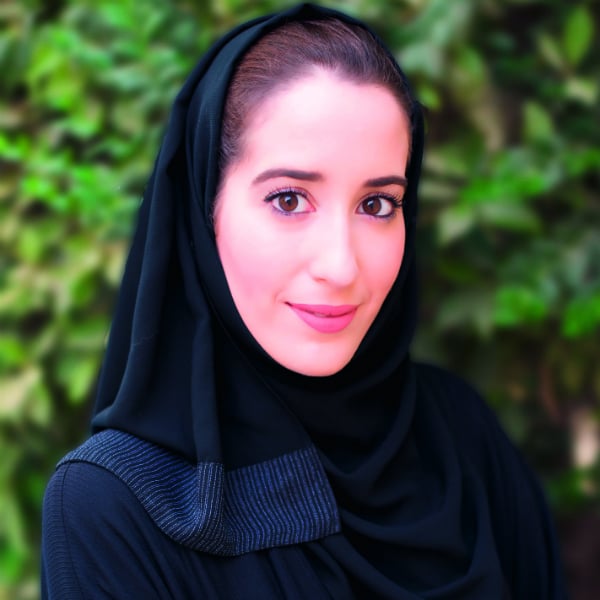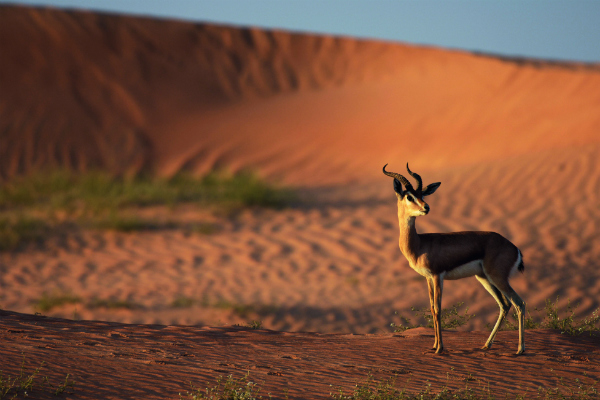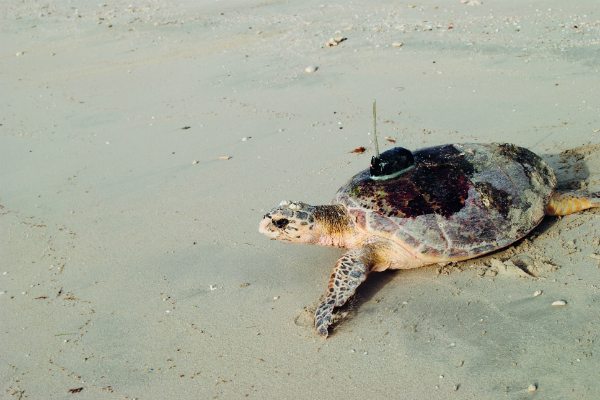Emirates Wildlife Society on the business of environmental sustainability
Laila Mostafa Abdullatif discusses the corporate benefits of environmental participation, and how the UAE’s Year of Giving is an opportunity for the public and private sectors to make an impact

The notion of ‘progress’ can – and has – been the subject of intense debate throughout history.
Whether framed around the economy, technology, welfare, society, or any other topic, different viewpoints, philosophies and agendas have – and will – be argued for and against with great ferocity.
One of the current era’s most ardently fought over issues is the environment. Global warming, intensive farming, mass urbanisation, pollution, climate change resource depletion and numerous other topics have been in the spotlight in recent decades – with the discussion intensifying in the past few years.
Major incidents such as the Exxon Valdez and Deepwater Horizon oil spills, the Chernobyl and Fukushima nuclear power plant accidents, the build-up of the Great Pacific garbage patch, the outcry over GMO farming, the Kuwaiti Oil Fires, chemical warfare, and many more have dominated headlines and debate.
And with global commitments by governments and organisations at events such as the United Nations Climate Change Conference – where the Paris Agreement was negotiated in 2015 to reduce greenhouse gas emissions – there are few discussions that rank so highly in importance, with views so varied.
Among the most pertinent issues for the Gulf region is urbanisation – certainly for the UAE in general and Dubai in particular – which continues to grow at an accelerated rate, as it has for the past 30 years.
Not only is the erosion of natural habitat a major consideration in this regard, but also matters that are associated with population booms – an increased carbon footprint, large-scale waste production, and countless others.
It is against this backdrop that environment agencies and non-government organisations across the GCC work to strike a balance between environment and development. A difficult tightrope to walk in any part of the world, but perhaps made all the more difficult by the Gulf’s rapid post-oil rise.
One such NGO negotiating that highwire is Emirates Wildlife Society, in association with the World Wildlife Fund.
EWS-WWF was created in 2001 to help protect biodiversity in key sites across the UAE, raise awareness of the UAE’s ecological footprint, and contribute to policy and institutional frameworks that address environmental issues.
Among its remits are projects and initiatives concerning marine conservation, including the protection of endangered turtles, 40 species of shark, and the ocean itself with its vital habitats such as coral reefs and sea grass beds. Terrestrial conservation focuses on land-based species and ecosystems such as wetlands, mountains and desert scrublands, while the organisation also works to support climate change initiatives in the region – helping to shrink the UAE’s ecological footprint and increase support for renewable energy.
A wildlife trade programme in cooperation with leading government and private sector stakeholders targets the ‘high-profit, low risk’ illegal wildlife trade that continues to escalate an alarming rate, and extensive environmental education and outreach initiatives aim to give young people in particular the tools they need to understand and act up key issues.
But despite the amount of work that must necessarily take place to establish long-term sustainability, the director general at EWS-WWF, Laila Mostafa Abdullatif, believes that there is no reason the fine balance between environment and development can’t be struck. And rather than rely on good intentions, she and the organisation put their beliefs into practice.
“At EWS-WWF, we believe that our economy, society and environment can thrive in unison, and together we can build a prosperous future in harmony with nature,” she tells Gulf Business.
“We help drive collective action by partnering and connecting policy makers, businesses, government entities, the scientific community, academia, other NGOs and the public. In the present and immediate future we continue to be particularly focused on raising national awareness about how environmental sustainability matters to business.”
Working heavily to drive action on climate change, biodiversity conversation and wildlife trade, EWS-WWF also strives to educate on the environment and partners with business and government communities to encourage sustainable practices – counting more than 140 public and private entities across the Gulf as its partners.
And while Abdullatif recognises the challenges posed by fast-growing cities such as Dubai, she explains that these difficulties are not exclusive to the UAE and wider Gulf region.

“I don’t believe the challenges are unique to Dubai. In fact, across the world it’s fair to say the value we realise from our natural capital including oceans and coastlines continues to expand rapidly.
“A 2015 WWF report, produced in conjunction with Boston Consulting Group, estimates that the whole range of goods and services that flow from the world’s coastal and marine environments can be conservatively valued at $2.5 trillion each year, with the overall value of the ocean as an asset at 10 times that.
“The ocean and waters of the Gulf play a critical role for the UAE, not only related to fishing and aquaculture, tourism, leisure, and so on, but also across the business spectrum including production, supply chain and logistics.
“If we are to realise the full benefits of our seas and the oceans, both now and in the future, we must take action to ensure the long-term sustainability of this natural capital. Ocean stresses are well documented, bio-diversity is declining, temperatures are rising and plastics and other pollutants continue to accumulate in our seas.
“My belief is that businesses and consumers must recognise quickly that ocean based economies and land activities are interlinked. To achieve a long-term sustainable economy, the management of natural land and sea assets is vital.”
This recognition and environmental awareness has been given a brighter spotlight in 2017 thanks to the year being designated the ‘Year of Giving’ by the UAE’s President His Highness Sheikh Khalifa bin Zayed Al Nahyan.
Indeed, in writing about the Year of Giving, the Vice President and Prime Minister of the UAE and Ruler of Dubai, Sheikh Mohammed bin Rashid Al Maktoum mentioned: “We can give back to our environment – to clean beaches and deserts, to care for trees and to be kind to all inhabitants on our earth.”
Abdullatif says: “The UAE Year of Giving has been a wonderful opportunity to highlight the lesser known avenues available to all of us in ‘giving back’ to society, the nation and our environment as a whole.
“It is incredibly important for us as an environmental conservation organisation to enhance the public’s understanding about the direct link between the health of the natural environment and its impact on the health and prosperity of our nation as a whole.”
With corporations particularly in mind, EWS-WWF already has a number of programmes and initiatives designed to help businesses make an environmental impact.
These include the Citizen Science Programme, which allows teams to participate in a series of water research and learning activities inside the Wadi Wurayah National Park; and the Climate Change Research Learning Programme, which focusses on climate change education.
And the list of companies working in partnership with the NGO in different ways is as impressive as it is varied, featuring Abu Dhabi Commercial Bank, Dubai Electricity and Water Authority, Waha Capital, Diamond Developers, Linklaters, Geant, Majid Al Futtaim, HSBC and Grant Thornton among others.
Geant supermarket, for example, runs a micro donation scheme to reduce plastic bags, while Linklaters provides in-kind legal services and Grant Thornton offers in-kind financial audits.
“EWS-WWF is fortunate to enjoy the support of so many forward-thinking organisations, including many of our long-term partners whose contributions have enabled our work over the past 16 years,” says Abdullatif.
And in keeping with the UAE’s theme of giving, EWS-WWF started 2017 with the launch of a first of its kind initiative to support the environment through endowments.
“This joint initiative with the Mohammed bin Rashid Global Centre for Endowment Consultancy is following the Global Vision for Endowment, which was launched by His Highness Sheikh Mohammed bin Rashid Al Maktoum to revive the practice of endowment through innovative applications,” Abdullatif explains.
“The positive participation of the private sector and social figures has already contributed towards translating the vision of His Highness Sheikh Khalifa, which marks 2017 as the Year of Giving.”
There appears to be no shortage of goodwill from businesses and organisations to participate in EWS-WWF’s work – be it through financial donations, practical assistance, or any other method. And this is just as well according to Abdullatif, who emphasises that environmental goals cannot be met by NGOs alone.
“Achieving long-term environmental sustainability cannot be done in isolation,” she says.
“As a local conservation entity we can only achieve our goals by collaborating and engaging with the private and public sectors, as well as civil society and grassroots movements.
“To give you an example of this, public-private partnerships have been key to the success of the first phase of the Gulf Green Turtle Conservation project, which brought together eight partners from the UAE and Oman, with funding from businesses and governments alike.”

But while there is existing support from the private and public sector, there is always room for more cooperation, adds Abullatif.
“We are keen to work with more organisations in the field of marine conservation, be it through the sponsorship of endangered sea turtles as part of the Gulf Green Turtle project, or through a relatively new project investigating the shallow coastal waters of the Northern Gulf Emirates, with a view to understanding recommendations for the establishment of newly demarcated Marine Protected Areas.
“There are various ways for corporations and SMEs to join our conservation efforts and we are always delighted to hear from interested parties on any of our existing programmes or with new opportunities for collaborative working.”
The benefits of these collaborations to groups like EWS-WWF are clear, but there are also several good reasons for businesses to get involved in such projects.
As well as superficial image and deeper ethical considerations, energy efficiency, sustainability and employee welfare can be found in greener workplace environments.
It’s a corporate culture strongly advocated by Abullatif, who argues: “Taking an active role in environmental stewardship is in fact a golden opportunity for the business community to create innovative, smarter, more cost-effective and sustainable ways to succeed in increasingly competitive markets.
“The merits of this approach are being demonstrated by many brands such as global leaders Unilever, Ikea, Coca-Cola, IBM, Panasonic Microsoft and HSBC, as well as many UAE brands including Majid Al Futtaim – a well-recognised conglomerate working hard to reduce its own [carbon] footprint while supporting civil society.
“These and other organisations are already reaping the rewards and showing a positive return on investment from a variety of angles including revenue, stock performance, product-level profitability, brand reputation, accounting for externalities, reduced risk exposure, employee and consumer engagement, and more.”
And while it’s the larger corporations that are generating the headlines, entrepreneurs and small business owners are also part of the environment equation, despite sometimes self-inflicted perceptions that sustainability doesn’t affect them.
“While there may be a perception among smaller enterprises that sustainability issues only relate to large corporations, nothing could be further from the truth,” argues Abdullatif.
“In fact, it is the next generation of young business owners who can embed positive impact as their business evolves. Perhaps owners believe they cannot afford to be sustainable, that measuring environmental performance is a costly and unnecessary burden. However, newly formed companies that integrate sustainability into their core business strategy at the earliest opportunity are likely to benefit from lower costs, reduced risk, and be nimble in responding to new market opportunities.
“Through our Corporate Membership Programme, we offer access to experts whose knowledge and guidance can be useful to those who may be just starting their sustainability journey.”
The desire among companies of all sizes to follow a sustainable path cannot be underestimated. A recent EWS-WWF study showed that 89 per cent of businesses in the UAE wanted more information on how to reduce their environmental impact, which Abdullatif says suggests a groundswell of awareness.
Highlighting one of the reasons companies should follow through with their interest, a 2015 Cone Communications and Ebiquiy Global CSR Study showed that some 88 per cent of global customers were found to be more loyal to companies that support environmental and social issues.
“To be successful though, sustainability efforts need to be embedded as an organisational priority, not only with clear support from leadership, but also reach across to influence a company’s supplier base,” Abdullatif adds.
As engagement by corporations increases and a more concerted push is made for environmental sustainability, the work of EWS-WWF and other similar organisations becomes much more impactful. Something Abdullatif is quick to acknowledge.
“It would be true to say that without the support and contributions from instrumental forward-thinking institutions, it would not be possible to create a lasting impact. It is thanks to the support of [our partners] that we at EWS-WWF are able work towards a future where businesses and people live in harmony with nature.
“We look forward to collaborating with many more private sector champions who recognise that environmental stewardship is the smart choice for today and tomorrow.”
